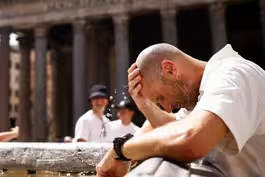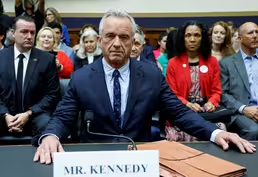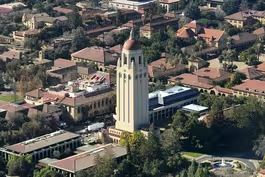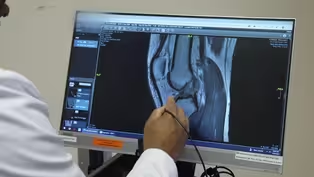
Texas women testify in lawsuit against abortion restrictions
Clip: 7/20/2023 | 7m 15sVideo has Closed Captions
Texas women testify in lawsuit claiming abortion restrictions put their lives in jeopardy
Texas women seeking to block a portion of their state’s abortion law are in court this week testifying the strict restrictions put their lives in jeopardy. The lawsuit is believed to be the first filed by women directly impacted by abortion bans that went into effect after the overturn of Roe v. Wade. Stephanie Sy discussed the case with Sarah Varney of KFF Health News.
Problems playing video? | Closed Captioning Feedback
Problems playing video? | Closed Captioning Feedback
Major corporate funding for the PBS News Hour is provided by BDO, BNSF, Consumer Cellular, American Cruise Lines, and Raymond James. Funding for the PBS NewsHour Weekend is provided by...

Texas women testify in lawsuit against abortion restrictions
Clip: 7/20/2023 | 7m 15sVideo has Closed Captions
Texas women seeking to block a portion of their state’s abortion law are in court this week testifying the strict restrictions put their lives in jeopardy. The lawsuit is believed to be the first filed by women directly impacted by abortion bans that went into effect after the overturn of Roe v. Wade. Stephanie Sy discussed the case with Sarah Varney of KFF Health News.
Problems playing video? | Closed Captioning Feedback
How to Watch PBS News Hour
PBS News Hour is available to stream on pbs.org and the free PBS App, available on iPhone, Apple TV, Android TV, Android smartphones, Amazon Fire TV, Amazon Fire Tablet, Roku, Samsung Smart TV, and Vizio.
Providing Support for PBS.org
Learn Moreabout PBS online sponsorshipGEOFF BENNETT: A group of Texas women seeking to block part of their state's abortion law are in court this week testifying the state's strict abortion restrictions put their lives in jeopardy.
Stephanie Sy has the story.
STEPHANIE SY: More than a dozen women allege in the suit that they were denied emergency care because of restrictions that banned doctors from performing abortions, except in cases to save the life of a pregnant patient.
The lawsuit is believed to be the first filed by women directly impacted by abortion bans that went into effect after the U.S. Supreme Court overturned Roe v. Wade last year.
Sarah Varney, senior correspondent for KFF Health News, has been following this week's arguments and joins us now.
Sarah, welcome to the "NewsHour" again.
Sarah, one of the women in the hearing today describe what it was like to find out she was carrying a fetus with a serious birth defect, and then not being given the option to have an abortion.
And she happens to be a doctor herself.
DR. AUSTIN DENNARD, Suing Texas Over Abortion Ban: I felt like my pregnancy was not my own, that it belonged to the state, because I no longer had a choice of what I could do.
I felt abandoned.
I couldn't believe that, after spending my entire life in this state, being a sixth-generation Texan, practicing medicine in the state, that the state had completely turned their back on me.
And, for then, my only choice was to continue the pregnancy.
STEPHANIE SY: Sarah, I know you have interviewed Dr. Dennard.
What ended up happening to her?
And do the other witnesses share similar accounts?
SARAH VARNEY, KFF Health News: So she and her husband did end up going to a state out east for an abortion.
She also has two children.
So she had to find someone to watch her children for her.
She talked about how, when she was facing this decision, that she didn't want her children to see her growing belly, knowing that this pregnancy was not viable.
And then she also really talked very movingly about how she wanted to be healthy so that she could be a mother to her current children, so that she could be a wife and a physician to her patients.
This was incredibly moving testimony and not something that we have heard before since Dobbs.
It was interesting.
On cross-examination, the state -- attorneys for the state really had a hard time figuring out what kinds of questions just to ask her.
And it was a very -- there were very awkward moments in the courtroom.
There was one point where the attorney said, "Did the attorney general, Ken Paxton, ever tell you that you couldn't get an abortion?"
She said: "I have not spoken to the attorney general."
That -- she was asked the fact that she was over 35 when she was pregnant with this pregnancy that was nonviable.
Was that considered a -- quote -- "geriatric pregnancy?"
Very awkward moments.
I think many of us who have had children, who've had miscarriages, who've maybe had them over 35, it was a cringeworthy moment in the courtroom.
STEPHANIE SY: Yes, and I believe the doctor had -- the fetus had anencephaly, which, again, any of us who have been pregnant know how serious that is.
It is basically when the baby's brain and skull does not form.
There was also a witness yesterday who testified to that and, from what I understand, ended up having to deliver the baby.
SARAH VARNEY: That's correct.
And anencephaly is a -- and other types of genetic disorders where the brain and the skull does not form can be very dangerous for women to birth vaginally.
There is no skull to press against the cervix in order to open the cervix for delivery.
So, almost always, it's a C-section.
And, usually, within minutes or hours, this is a child that dies in a very painful way.
There are some women who do choose to do that.
And they do provide palliative care for the newborn.
But, in this case, and in many cases, women have said, I want to be able to have that choice for myself.
STEPHANIE SY: You know, as a journalist, Sarah, who has been covering the fallout of the Dobbs decision for the better part of a year, what else is different that you're saying about this hearing?
SARAH VARNEY: This is really extraordinary.
I think up, until now, a lot of the cases that we have watched that, we have covered on the "NewsHour," the mifepristone lawsuit that was in Texas before Judge Kacsmaryk, who used this very extremist Christian language in his -- in the courtroom and in his decision.
This is a judge who has overruled the objections from the state many times today and yesterday, allowing witnesses to continue their testimony, even asking her own questions.
At one point, she turned to one of the expert witnesses and said: "Can you tell me, are doctors in Texas required to take a pledge to the Hippocratic oath?"
And the witness responded: "Yes."
So, clearly, this is a judge that's very engaged.
This is taking place in Austin.
This is not in Amarillo, Texas, where there was only one Trump-appointed judge.
So just the mood in the courtroom is very different.
And just to really hear the stories from these women, I think up until this point, as journalists, we have been covering these stories, reporting them, but they have not really had to get entered into a court of law, and the people who are supporting these laws, the anti-abortion organizations and states like Texas, having to really answer to the physical, mental, emotional harms that these laws are causing these women.
STEPHANIE SY: Texas is -- as you know, it's a unique case, because, even before the Dobbs decision, the Texas legislature had been able to pass a very restrictive abortion ban.
So we have been able to see sort of the impacts on women and babies.
Those impacts have started to be measured, right?
SARAH VARNEY: That's exactly right.
So, this was called S.B.8.
It was a six-week abortion ban that went into effect prior to Dobbs, as you said.
And, yes, we're all looking at Texas very closely.
There's a couple of data points that we can point to now.
Just yesterday, there was some new data released that showed an 11.5 percent increase in infant mortality in Texas.
Many of the OB-GYNs in Texas that I spoke to said that, while there are more people in Texas, people -- more people have moved to Texas, that can't explain this, that, clearly, when you have women who are being forced to carry nonviable pregnancies, like fetuses with anencephaly, clearly, you will have an increase in infant mortality.
The other thing that we have seen so far in Texas, there was some statistical modeling that came out within the last week that showed an increase of about 10,000 additional bursts, so, essentially, what are being called forced births.
So these would be women who would have normally not carried those pregnancies to term.
So those are two pieces of data that we have now.
STEPHANIE SY: It is certainly a case that may have impacts within Texas and beyond.
We will continue to watch it.
Sarah Varney, thank you so much for your reporting.
SARAH VARNEY: Thank you.
Heat waves break records and disrupt life across world
Video has Closed Captions
Clip: 7/20/2023 | 9m 23s | Punishing heat waves break records and disrupt life across much of the world (9m 23s)
Millions flee homes in Sudan amid reports of war crimes
Video has Closed Captions
Clip: 7/20/2023 | 6m 21s | Millions flee homes in Sudan amid reports of widespread war crimes (6m 21s)
RFK Jr. comments spreading misinformation draw scrutiny
Video has Closed Captions
Clip: 7/20/2023 | 10m 43s | RFK Jr. appears before Congress as his comments spreading misinformation draw scrutiny (10m 43s)
Stanford president resigns after report on flawed research
Video has Closed Captions
Clip: 7/20/2023 | 5m 24s | Student journalist discusses reporting that led to Stanford president's resignation (5m 24s)
Why ACL injuries are more common in female athletes
Video has Closed Captions
Clip: 7/20/2023 | 8m 8s | Why ACL injuries are more common in female athletes than male counterparts (8m 8s)
Providing Support for PBS.org
Learn Moreabout PBS online sponsorship
- News and Public Affairs

FRONTLINE is investigative journalism that questions, explains and changes our world.

- News and Public Affairs

Amanpour and Company features conversations with leaders and decision makers.












Support for PBS provided by:
Major corporate funding for the PBS News Hour is provided by BDO, BNSF, Consumer Cellular, American Cruise Lines, and Raymond James. Funding for the PBS NewsHour Weekend is provided by...




